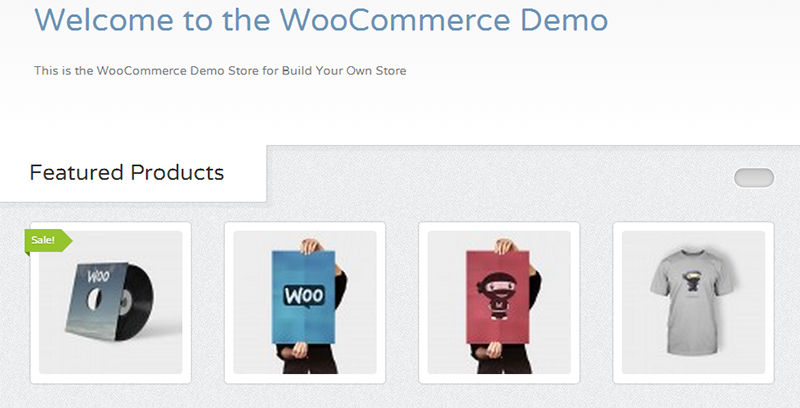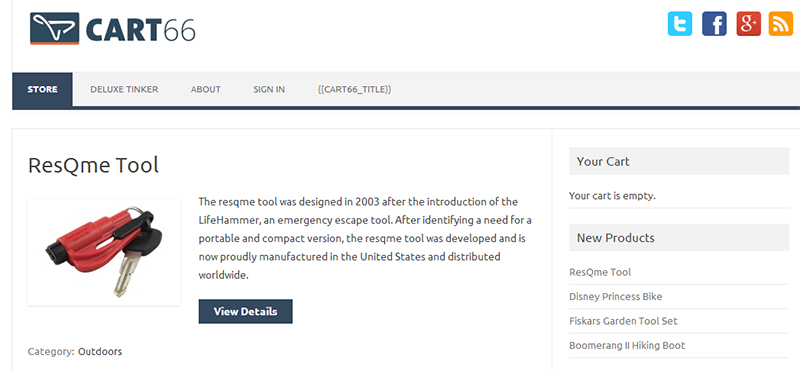WordPress is an extremely versatile platform, with a diverse range of capabilities. One of the most popular (and growing) uses of WordPress is running an eCommerce website. Thanks to some very brilliant plugins it’s possible to set up a online shop at a relatively low cost while still achieving professional design and functionality.
In this article I will show you five of the best WordPress shopping cart plugins, including their front-end design and most important features. Each plugin has its own strengths and weaknesses, so you will find pros and cons for each one of them.
1. WooCommerce

WooCommerce demo
WooCommerce is by far the most popular eCommerce plugin for WordPress. It has definitely taken it’s place as a perfect alternative to Magento, which is considered the current leader in open source eCommerce software.
Originally a fork of Jigoshop, WooCommerce is a free plugin maintained by WooThemes a very popular WordPress themes shop with lots of marketing power behind it. Popularity is one of the reasons for WooCommerce’s success, but being hot gets you nowhere in the long run. What’s more important is that WooThemes has put some serious effort into its product development, largely depending on it to keep the business running. WooCommerce is also supported by a large and active developer community, including it’s own dedicated developer and shop owner conference.
And it shows, WooCommerce has many great features which make it a very worthy contender in this list. It includes important tools to start your online shop out of the box right away (even it’s base theme is quite nice). But eventually you’ll want to expand the default feature set, and that’s where a major downside of WooCommerce comes in: pricing.
WooCommerce relies heavily on extensions. If you want to use table rate shipping, you will need to pay $199 for a single-site license. The same goes for subscriptions. Want to add one or more payment or shipping gateways? Add another $79 for each gateway. And these are 1-year licenses. You could easily run into $100s of subscriptions per year, making it not so free anymore.
These are the prices for WooThemes backed plugins. There are some independent developers, but since WooThemes makes it very attractive to sell through them right away, you won’t find many.
WooCommerce Pros – Easy to use, you can have your store set up out of the box within an hour. – Built and actively maintained by one of the leaders in the WordPress community. – WooCommerce provides a mobile app to manage your store.
WooCommerce Cons – Danger of vendor lock-in, with both the product and its extensions run by one company. – Very pricey extensions for sometimes basic functionality. – Not every theme works with WooCommerce, so check this out first.
2. WP eCommerce

Once the most popular eCommerce plugin (now surpassed by WooCommerce), WP eCommerce (WPEC) offers tons of features and is actively maintained by a large group of developers.
It is more community driven than WooCommerce, to an extent that’s it is not even clear who you are paying when you decide to buy premium plugins or support. But if you are a developer yourself, WPEC may be less limiting than WooCommerce is.
WPEC offers tons of features, but not all of them are very well implemented. Coupons are a good example: you can use them but only on cart level and with limited set up (which makes tracking harder, and allows for abuse).
There is the possibility to pay for premium support, but it is quite expensive at $47 for one support ticket. They also offer a Gold Cart Plugin ($47). This one comes with a few basic options which should have been included (like Grid View), but also opens up a lot of new payment gateways (some of them unknown or very specific). It also comes with one support token, and offers great value.
WP eCommerce Pros – Built-in table rate shipping with a good number of integrated shipping companies. – Many free or low-priced add-ons. – Works almost perfectly with any theme or plugin.
WP eCommerce Cons – Limited payment gateways (basically only PayPal). – Rich in features, but not so much in feature details. – Lots of small bugs which can take some time to be fixed.
3. Cart66

Cart66 comes in two different flavors: Cart66 Pro (the WordPress plugin) and Cart66 Cloud (the hosted version, based on the plugin but modified in many ways). I will have a look at the WordPress plugin.
Priced at /$149 for an unlimited site license, Cart66 is the most expensive plugin in this list. But it does offer both subscriptions and memberships, features for which the other plugins often charge a premium. It also comes with professional support. They spend a lot of time and effort in making the plugin as secure as can be, and really work out their features.
Cart66 beats the other plugins on payment and shipping gateways. It also comes with a very advanced coupon system which allows for custom newsletter links for example. You can even use your ‘Buy now’ buttons in various ways like on your social media accounts.
Combining extensive features with professional support is a golden combination. The price is quite high, but especially for store owners not that familiar with the technical side of things, Cart66 could be a very good choice.
Cart66 Pros – Works with almost any WordPress theme and plugin. – Professional support and useful payment/shipping gateways included. – Rich and detailed feature set.
Cart66 Cons – Pricing is pretty steep for a WordPress plugin. – The company behind Cart66 is focusing more and more on their cloud based solution (but is fully supporting the plugin for now). – Very confusing sales site, mixing the features of both the plugin and cloud version, while they are not always the same (but maybe that’s just me…).
4. Shopp

Shopp takes the same approach as WPEC, combining a free plugin with paid professional support. Only in this case, there’s an identifiable company behind the plugin, which makes it a bit more certain who you are dealing with.
Shopp definitely has an excellent sales page for their product, showing its tons of features in a convenient way. And these features are really worth showing. Each feature has been really thought through. I like to use coupons as an example, since these can be compared quite easily for each plugin.
Shopp offers tons of configuration possibilities. Not only can you apply a discount to a product or the whole shopping cart, but you can even offer ‘Buy X get Y free’ or for specific customer types (like wholesale). Same goes for shipping which has many ways of setting up, basically anyway you would need. And you can hook up several large shipping companies (with paid add-ons) to allow for real time rates.
A bit of a disappointment is its integrated payment providers. By default, it has a few major providers, but its add-ons don’t allow for many more useful providers to be added. This limits your choices, which is odd given the high amount of flexibility the plugin offers for the other features.
Shopp Pros – Very extensive and detailed feature set. – Support is moderately priced at $75 a year per site. – Decent pricing for add-ons.
Shopp Cons – Limited amount of supported payment providers. – Updates come with the support license, which needs to be renewed each year. – Limited number of themes available.
5. MarketPress

MarketPress is offered by WPMU DEV, which is a powerhouse when it comes to WordPress plugins and themes. At $19 for an unlimited site license it is quite a steal, but for support and updates you need to upgrade to a far more expensive monthly plan (which does open up the full library of WPMU DEV plugins).
One of its main features is the ability to run a store network. You can run multiple stores yourself, allowing for unified checkout. You can even offer the option for third-party vendors to run a store on your very own network where you take a percentage of their sales, becoming something like a ‘Mall-boss’.
MarketPress comes with some very clever features, like stock notification for product variations and custom personalization fields. You can also track your coupon codes or specify a maximum number of uses.
It works with any theme or plugin and has a decent number of well known payment providers. But when it comes to shipping, it lacks flexibility and rates, as well as offering a very limited number of shipping gateways. Currently only UPS and USPS are supported, and they are working on adding FedEx.
MarketPress is definitely worth a try, and with the $19 price tag it also comes with one month of support. This is an even greater steal than the plugin alone.
MarketPress Pros – Run your own network of stores, even like a mall. – Low pricing with support included for one month. – Clever features which sets the product apart.
MarketPress Cons – Limited number of shipping providers. – Extended support and updates require a pricey monthly license. – No possibility to add functionality with add-ons.
Alternative Shopping Carts
If you are not convinced of WordPress as the base for an eCommerce store, you might want to consider some alternatives. Luckily I’ve written about this previously:
- Testing 3 Hosted Shopping Carts
- Self Hosted Shopping Carts: Magento and WooCommerce Compared
- More Hosted Shopping Carts: BigCommerce and Volusion
- Self Hosted Shopping Carts: Prestashop vs. OpenCart
- Magento vs. X-Cart (+ Screencast)
Conclusion
Running an eCommerce store on WordPress can be done in many ways. Each plugin has lots of common features, but each one takes a different approach. You can try them all, even Cart66 which has a 30-days refund policy.
Please let me know in the comments which WordPress eCommerce plugin you prefer.
Frequently Asked Questions about WordPress Shopping Cart Plugins
What are the key features to look for in a WordPress shopping cart plugin?
When choosing a WordPress shopping cart plugin, it’s important to consider the specific needs of your online store. Key features to look for include a user-friendly interface, mobile compatibility, social media integration, SEO capabilities, customer reviews and ratings, secure payment gateways, and customizable design options. Additionally, it’s beneficial to choose a plugin that offers strong customer support and regular updates to ensure your online store runs smoothly and efficiently.
Are WordPress shopping cart plugins mobile-friendly?
Most WordPress shopping cart plugins are designed to be mobile-friendly. This is crucial as more and more consumers are shopping on their mobile devices. A mobile-friendly plugin ensures that your online store is accessible to all users, regardless of the device they are using.
How do WordPress shopping cart plugins affect site speed?
The speed of your website can significantly impact your conversion rate and SEO, and shopping cart plugins can affect your site speed. Some plugins are coded more efficiently than others, so it’s important to choose a well-optimized shopping cart plugin that won’t slow down your site.
Can I customize the design of my shopping cart with a WordPress plugin?
Yes, many WordPress shopping cart plugins allow you to customize the design of your checkout process, so it aligns with your overall website design. This can include changing colors, fonts, and layout styles.
Are WordPress shopping cart plugins SEO-friendly?
Most WordPress shopping cart plugins are designed with SEO in mind. They often include features like meta tags, sitemaps, and SEO-friendly URLs, which can help improve your online store’s visibility in search engine results.
How secure are WordPress shopping cart plugins?
Security is a crucial aspect of any online store, and most WordPress shopping cart plugins offer robust security features. This can include SSL certification, secure payment gateways, and regular security updates.
Do WordPress shopping cart plugins offer customer support?
Yes, most WordPress shopping cart plugins offer customer support. This can be in the form of live chat, email support, or online forums. It’s important to choose a plugin that offers strong customer support to help you navigate any issues that may arise.
Can I integrate social media with a WordPress shopping cart plugin?
Yes, many WordPress shopping cart plugins allow you to integrate your online store with social media platforms. This can help increase your store’s visibility and reach a wider audience.
Do WordPress shopping cart plugins offer analytics and reporting?
Yes, most WordPress shopping cart plugins offer analytics and reporting features. This can help you track your sales, understand customer behavior, and make informed decisions about your online store.
Can I use a WordPress shopping cart plugin for a multi-vendor marketplace?
Yes, some WordPress shopping cart plugins are designed to handle multi-vendor marketplaces. These plugins allow multiple vendors to sell their products through your online store, with each vendor having their own individual storefront.
 Jacco Blankenspoor
Jacco BlankenspoorJacco Blankenspoor is a website developer from the Netherlands, and is currently just building lots of different websites. When he is not working on HIPAAHQ.com you might catch him grinding coffee.
